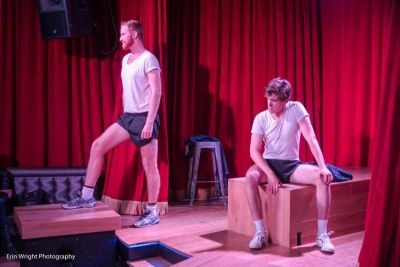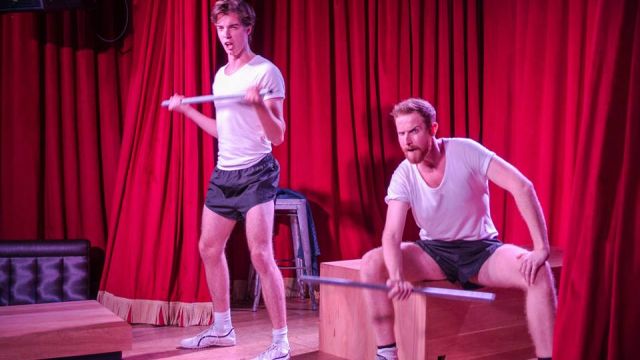The Night Larry Kramer Kissed Me
This two-man play returns for an encore season, reprogrammed at much more civilised times after a season of late nights during the Mardi Gras festival.
It’s a seminal gay play at a seminal gay bar, of sorts, on Taylor Square. Originally performed by the author off-Broadway – and 20 years ago at Belvoir Street – it’s a series of vignettes around some key moments in one man’s life: his first attraction to musicals, buying a Village People record as a young boy, the night activist Larry Kramer “kissed” him at the theatre, nightclubs and gym sessions. And the horror of AIDS in the 1980s and 90s.
This piece is traditionally performed by one man but in this production the part is split in two. Two emerging actors, Ben Hudson and James Wright, are given roughly half the play each. Both are very good, their timing is down pat; they work with synchronicity and amazing energy. While much of the material feels of its time, the play hasn’t dated. It’s tight, fast and often funny – much credit is due to young director Kynan Francis.
Presumably the aim in splitting the part was to show different interpretations of a character (or characters) but I wasn’t convinced these monologues worked any better when performed by two. It’s more difficult for one person to keep an audience captive but when done well, it reaps rewards.

If two people are on stage, they should interact. Hudson and Wright have chemistry but they barely get to show it. The show clearly worked well originally as a one-man play and I’m not convinced it needed to change.
There’s a revised ending too, with updated jokes about Madonna, the Obamas and John Travolta. It’s funny and the audience certainly livened up, enjoying the change of pace from the more sombre but touching scenes showing the impact of the AIDS epidemic.
I didn’t see the original play and apparently the ending is only slightly revised. It’s about contemporary issues such as gay families and marriage equality and is, presumably, designed to show optimism, much of it proving well-founded, on just how far things can progress.
But it’s a significant leap, with only the barest of links to the rest of the play, a footnote that doesn’t add much to our understanding of this man. What’s more, the significance of these issues pales in comparison – marriage equality, while important to many, doesn’t have the devastating weight of the AIDS virus and the prejudices it exposes. This final scene would have been more effective if it referred back to the rest of the play – attitudes to HIV, say, or the Village People, or coming out.
But while I wasn’t persuaded of the merits of splitting the role in two, or the ending, this is a strong production, simple but well-imagined, with two vigorous and completely believable performances. Each actor could probably have played the role convincingly on his own. It’s a shame they had to share.
Peter Gotting
Images: Erin Wright Photography
Subscribe to our E-Newsletter, buy our latest print edition or find a Performing Arts book at Book Nook.

